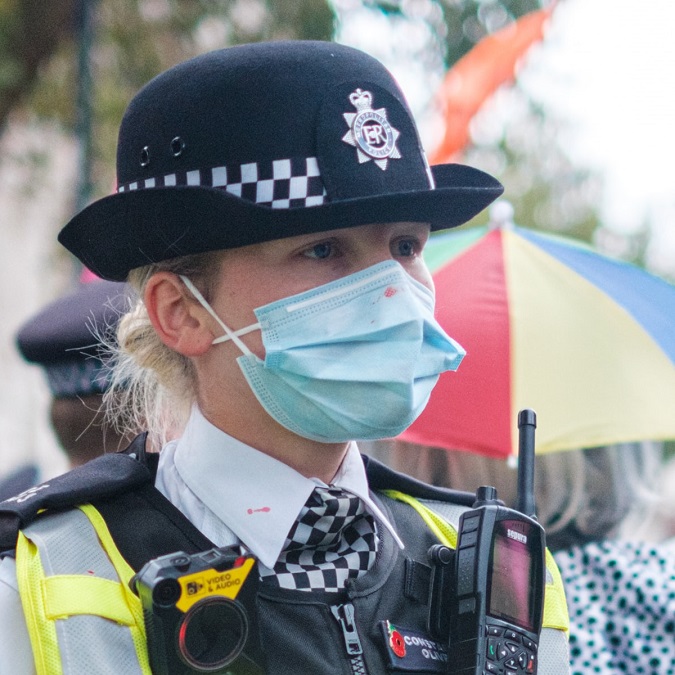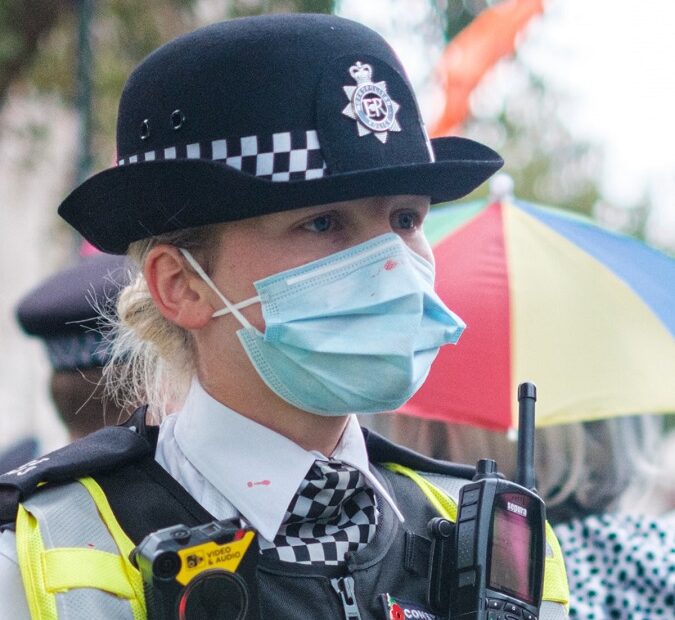 In the latest career profile from Insight Edge, we take a look at what it’s like to work in the police, and feature an interview with a Detective Constable working on the serious and organised crime group.
In the latest career profile from Insight Edge, we take a look at what it’s like to work in the police, and feature an interview with a Detective Constable working on the serious and organised crime group.
Those who work in the police are responsible for protecting the public from crime, as well as supporting victims of crime and assisting the community with reassurance, advice, and education. According to stats published by the House of Commons last month, there were 153,000 police officers employed across 46 police forces in the UK in 2020, making the combined police community the second largest employer in the UK behind the NHS. The Metropolitan Police alone employs 34,000 people, making it similar in size to the Royal Navy and Royal Air Force. Just over 30% of all police employees are female, although this number is slowly increasing, with 37% of new recruits in 2020 being female.
The starting salary for police constables in the UK is approximately £21k, rising to a maximum of £41k at the top of the scale, which is achievable after a number of years n the role.
Samantha Walker* is a Detective Constable (DC) on the serious and organised crime group. She investigates crimes ranging from conspiracies such as drugs, burglaries and human trafficking, to murders, child sex offences, rape and potential terror offences. Asked about a typical day in her role, Samantha explains:
“An average day for me is absolutely not average! The nature of the crimes I investigate means that investigations can be long and drawn out, often taking up to 2 years due to the complexities of the evidence gathering. I will check the systems for any updates and seek opportunities to capture evidence, which could be through CCTV, witnesses, phone data, ANPR data etc. There are often lots of different ways to capture evidence, and it’s my job to put the pieces of the puzzle together and pick the right tactical approach to get those pieces of evidence. Often an incident will have happened that I need to collate evidence for and there can be numerous incidents in a day which build a bigger picture of criminality around individuals or crime groups.”
“There are lots of good parts to the job. When I started my detective training, I loved helping victims. It’s never a good day for a member of the public if the police are at their door. They could be reporting a loved one missing, reporting a crime they are victim of or potentially there to be spoken with about an incident they may have been involved with. For me, my priority was making sure the victim was well looked after and made to feel heard. It’s all too easy to take a report and go off to complete the paperwork, but putting a human face to the uniform can make a real difference. Since coming to serious and organised crime I don’t tend to have quite as much input from victims of crime, but I have found a real passion for outside the box thinking in order to investigate conspiracies and being able to link incidents together through different strategies. A lot of work that goes into the investigations, so it’s quite satisfying when it all points in one direction.”
As for the most challenging elements of a role in the police, Samantha talks about some tough experiences with individuals who see a uniform and not an individual:
“Some people have opinions of police as a whole which makes my life quite difficult at times but in the most part, with a bit of communication it tends to work out ok. I’ve had some tough life experiences within the police and have witnessed life (and death) through so many spectrums – it’s allowed me to view situations with a very open mind. Day to day, the biggest challenge seems to be that 24 hours just isn’t enough to get done what needs to be done! Sometimes it’s difficult to switch off even when you’re at home – but sometimes that can be a great thing for the job, I’ve often had an epiphany when I’m relaxed at home that something new might be useful to an investigation.”
“Shift work can also be very challenging. I deal with ‘live’ investigations which could mean very long shifts. Technically I work for a unit with a Monday to Friday, 8am until 4pm working pattern, however if something changes overnight, which it very frequently does, then I could be working from the very early hours. I tend not to plan anything during the week which limits a social life due to frequently working 16 hour shifts but it does then mean that the weekends are kept relatively free.”
Samantha’s career in the police has progressed at an impressive rate since she joined seven years ago, which she puts down to a number of key skills that are needed to be successful:
“An understanding of different levels of communication is key to my role. I often work with outside organisations, and people of different ranks and experience so it is important for me to be able to read the audience with my communication style. Organisation is another pivotal skill I’ve thrived on within this job – I’m a list maker and it helps me keep on top of tasks that need doing, working hypotheses and methods to achieve an outcome.”
“Organisation, decision making and communication have all lent themselves in my case to being a good leader. I like to think I’ve done well in leading a team towards a desired outcome. As an officer in the case (OIC) there a numerous strands to an investigation and you have a team working around you with tasks you provide which you then collate so all these skills are of fundamental standing to do the job I do. I am considering further education within leadership and that is something the police would support, as 2 people within the force per year receive a grant to complete a masters at the local university.”
The minimum qualification required for a career in the police varies between different forces, but the most common is a level three qualification such as an A Level or equivalent. There is a specific entry route for holders of a degree, though Samantha believes that her volunteering experiences have been as valuable as her education in helping her to succeed in her career:
“At university I studied English with Drama. At this stage of my career I don’t believe I’ve been able to put my skills in my degree areas to use, however there is a new process that says in order to be promoted to an inspector you must have a degree. That is constantly changing and should I want to become an inspector it will save me some time, but I don’t think it has made a difference to my career progress right now.”
“After my degree I took a break and volunteered at the Olympics – it fell at a good time for me because I didn’t want to start a job and then ask for time off for that commitment, but also it was a priority for me and something which has given me more experiences than many jobs would.”
“After university I didn’t have much of a plan around a career. I began volunteering as a special constable in the police whilst working for a managing agency; I dealt with contracts like Microsoft and Sainsburys who have sites where we would maintain assets. I managed engineers on sites across the country who would report faults, I would price up the parts, labour etc and possibly subcontract the work – it was very logistical but also very office based which I didn’t find challenged me. “
“I made the decision to join the police in 2014 because I was enjoying the challenges I was doing when I was volunteering more than I was going to work on a Monday morning. I was aware it was a real career opportunity which would open a number of different doors in the future. I started as a PC on intervention – responding to 999 calls. I then went to a tactical team where I conducted warrants for wanted people and drugs offences. Tac team was very much the enforcement side of the police. I then joined serious and organised crime where I became a detective and am now investigating high level criminals.”
Samantha is well on the way to achieving a number of her career goals, but continues to be ambitious. Asked about the best piece of career advice she has received during her time in the police, Samantha explains:
“Keep it simple. I guess that’s life advice really but with the pressures of this job it’s easy to never switch off and overthink things. The clearer your mind is the better and more methodically you can approach day to day tasks with clarity. Trying to take on too much work or responsibility doesn’t achieve anything in the long run. On intervention you’d often be what’s referred to as a ‘slave to the radio’ going from job to job and getting no down time at all then taking your work home with you. There is a lot of pride with particular kinds of jobs I deal with at the moment and a level of what can sometimes feel is personal responsibility to prove offences and bring people to justice because of the seriousness of the crimes I investigate. Whilst they can be complex investigations, getting bogged down in lots of work won’t assist the final outcome – a bit like putting on your own gas mask before you help others: take a breath and go again.”
As for the highlights of her time in the police so far, Samantha lists a number of inspiring achievements:
“I think it’s difficult to top physically saving someone’s life. I received a royal humane society award for finding a member of the public’s car in a ditch. They’d crashed having had a heart attack at the wheel and I began CPR on them on the side of the road and saved their life. I also came across a male having had a heart attack in the street (within my first two weeks of being a police officer!) and began CPR and brought him back around (it’s not quite as it looks on tv!). It’s quite a spectacular feeling and I can’t say I have a 100% success rate, but when I went to see them days later in hospital it was so emotional. Ultimately people are the most important thing to me as a person and to give a family some more time with their loved ones within my role is a real high point for me.”
Insight Edge provides personalised career guidance, giving you the knowledge and advice you need to make informed career decisions. If you’re considering a new career path and are ready to make the first step, take a look at the services we offer.
* An alternative name and photograph have been used to protect the officer’s identity.





